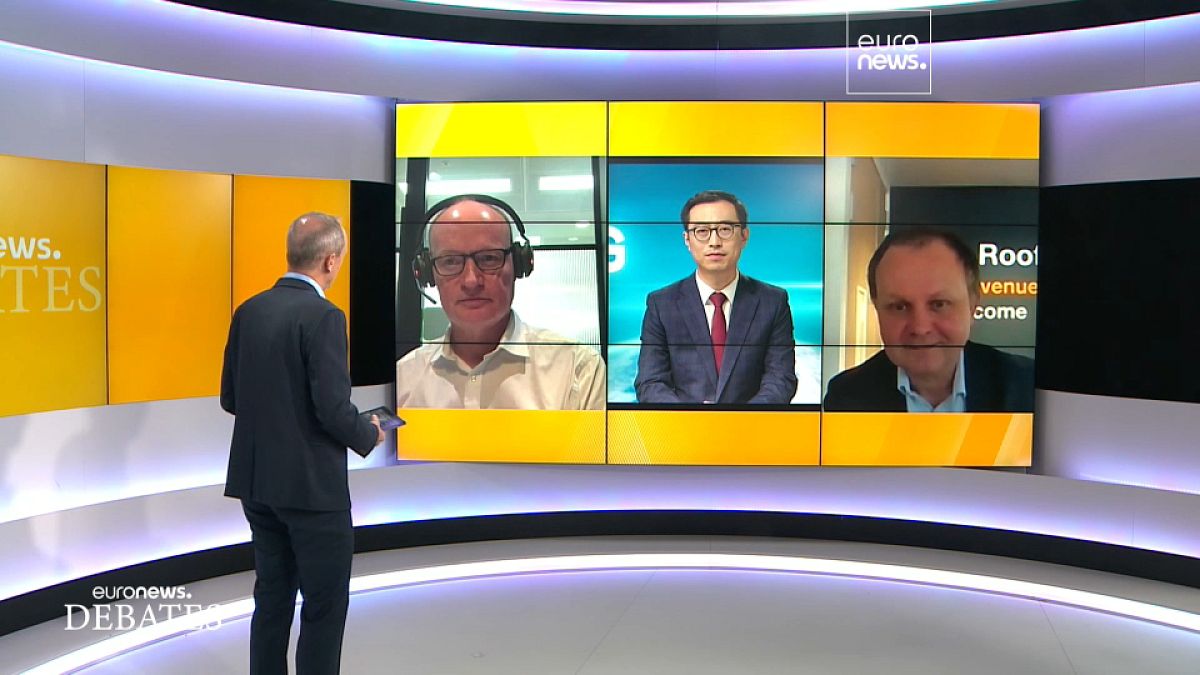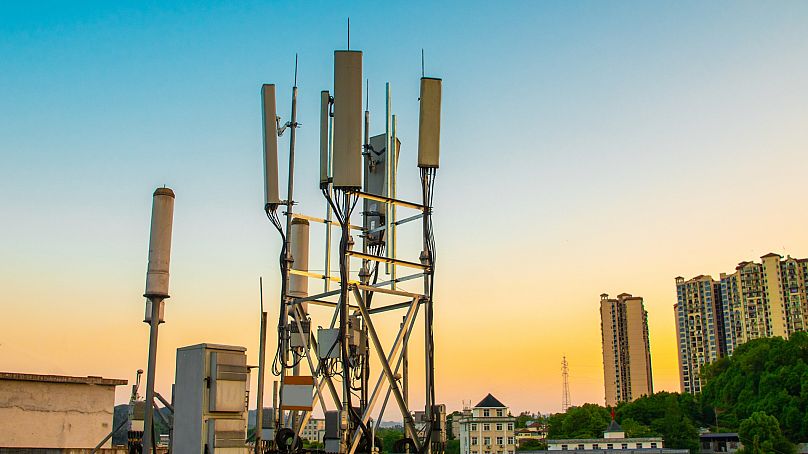In our latest Euronews debate, experts from Huawei, Orange and GSMA discuss the ways the roll-out of 5G will boost manufacturing, reduce energy consumption and offer new angles in entertainment for Europe
The rollout of 5G is gaining traction in Europe, leading many to question how this new generation of mobile technology will change the way Europe lives, works and interacts.
The planned successor to 4G mobile networks, the 5G rollout is in process and the infrastructure is being laid out.
There are 214 5G networks already live, with the many to be found in China, South Korea and the US.
Providing the fastest connection yet for mobile users, it is crucial that Europe adopts the technology to stay level with global leaders.
You can watch the entire debate in the video player at the top of this page.
During the debate, Euronews Science Correspondent Jeremy Wilks asked an expert panel about the ways 5G is being implemented across Europe, how it will benefit European productivity, and the security and energy issues surrounding the technology.
The panel comprised:
Laurent Leboucher - Chief Technical Officer of Orange
Alex Sinclair - Chief Technical Officer of GSMA
Dr. Philip (Xiaodi) Song - Chief Marketing Officer, Huawei Carrier Business Group
European 5G coverage is behind markets in China, South Korea and the US, but there has still been significant momentum in the past few years.
There are 108 5G networks across 34 markets in Europe already, with a goal of at least one network in each EU market met in 2020.
What are the challenges to European 5G rollout?
One of the key issues halting the uptake of 5G in Europe is the complexity of navigating the breadth of network carriers across so many distinct states. While China’s population is about 1.5 billion people, there are just four major carriers in the country.
The comparative ease with which China can politically and commercially navigate 5G rollout is shown by its recent results.
In just three years, there has been incredible growth, Dr Song explains.
“By the end of October, 20-30 operators have launched commercial 5G services, and more than three million 5G base stations deployed around the world. So over the past three years, the world's top 20 operators, by the number of the 5G stations, saw an average revenue per user increase by more than 10 per cent,” Song says.
Increased profits and faster rollout are clearly desirable, then. So what’s the picture like in Europe?
Leboucher explains that Orange is seeing impressive results with 5G rollout in French urban areas.
“User experience is already double what a 4G customer can experience in terms of bandwidth. So it means that in all cases, it's more than 200 megabits per second in cities,” Leboucher says.
One issue that’s key to progress is the release of spectrum licences. These licences are the permissions given by governments for entities to have exclusive right to a frequency band, essential for setting up a mobile network.
Leboucher notes that Poland is yet to grant Orange a spectrum licence, although he expects it to be done very soon.
Another challenge to deployment will be the ability to create a seamless network across the EU.
In China, 5G has already allowed for continuous internet network use while travelling, yet it is still a common occurrence for a European train passenger to lose signal as they cross an EU border.
Huawei solved the issue in China by deploying multiple smaller base stations along motorways, guaranteeing coverage, explains Dr Song.
Leboucher explains that Orange is experimenting in an EU-funded project to create this seamless service handover between the borders of Germany, France, Luxembourg and Belgium.
Given this, Leboucher asserts confidently that the EU should hit its 2025 target for widespread 5G coverage.
5G, What is it good for?
The debate then turned to the benefits that 5G will bring society when it is fully rolled out.
At an individual level, Dr Song noted how 5G has already improved experiences for sports fans worldwide.
“An operator in Greece has already launched a new basketball game live streaming service. It offers the 5G preview so it can blend a viewing and interactive experience,” Song explains.
It is only with the bandwidth capability of a 5G network that a sports event can simultaneously stream multiple camera angles to the thousands of individuals’ phones in a packed sports stadium.
The technique has also been utilised at home, Sinclair points out, with Formula One races giving viewers the choice of which camera angle/driver they want to follow the action with.
“That's a pretty high capacity demand,” Sinclair notes.
Other home technologies, like virtual reality gaming and the metaverse will also require increased bandwidth for seamless connections. However, it is probably in professional applications that 5G will have the most impact, the experts note.
Improved speed and efficiency of internet services are essential for the running of many major industries, from tech to medical. This will be particularly the case in dangerous industries, requiring remote controlled equipment.
“Throughout Africa, 5G now has been deployed in mines to enable remote operation,” Dr Song explains.
“This improves working conditions for miners and makes them safer and happier in their work,” he adds.
Similarly, Dr Song points out an example in Kuwait, where the oil and gas industry is leveraging 5G’s higher capacity and reliability across 800 kilometres of wells for higher speed safety alarms.
Safety and the environment
Any conversation about mass deployment of 5G has to consider the security and environmental issues of such a widespread technology.
Concerns around 5G have abounded since its introduction, ranging from conspiracy theories linking it to the COVID-19 pandemic, to more genuine data security worries.
GSMA's Alex Sinclair notes that despite public caution, "5G is the most secure generation ever produced". This is thanks to features such as the encryption between devices and the network.
If there is a security risk, it actually comes from 5G existing alongside previous generations, 2G, 3G and 4G. When 2G was first implemented in the 1990s, the security paradigm that necessitates encryption was not standard.
“Some attackers will basically try and take advantage of that by bidding you down. They'll pretend they don't support 5G. So even if you've got a 5G device, they might basically try and force you back to an older technology that would have more weaknesses,” Sinclair explains.
From Huawei’s perspective, Dr Song also reassures that they “are working tirelessly to deal with the security and the trustworthiness of quality products.”
Another concern with the increased rollout of 5G is the impact that these networks will have on the environment.
Again, Sinclair explains there is less to be worried about than it may seem. Although the amount of data created today is orders of magnitude higher than it was 15 years ago, the amount of energy required for the increased data hasn’t gone up.
“That's largely because each successive generation of technology has been much more energy efficient,” Sinclair says.
“5G is about 10 times more energy efficient than the 4G network,” Dr Song adds.
Finally, Orange's Leboucher points out that the advances in network connectivity that 5G provides will also provide companies the opportunity to reduce their carbon output, through data efficiencies.
“It's not just about reducing energy consumption or controlling the energy consumption of the network and also reducing the CO2 impact of networks. It's also even more important to use and leverage 5G to help other companies within their own businesses manage scarce resources better to manage and consume less energy. Because we will leverage more data, we will be smarter,” Leboucher concludes.
You can watch the entire debate in the video player at the top of this page.


